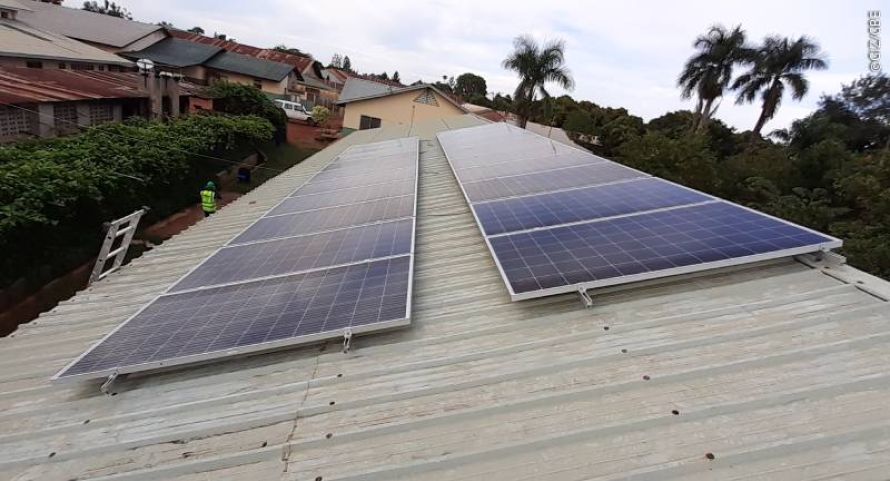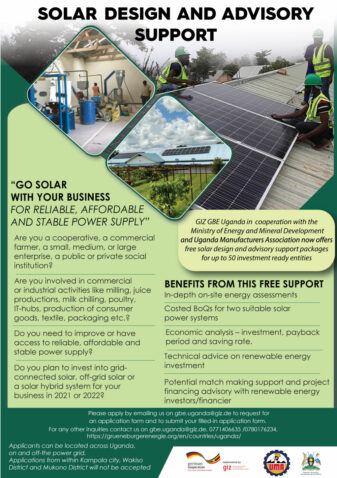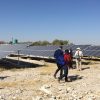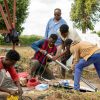GBE launches solar design advisory support for SMEs in Uganda

Electricity supply in Uganda is expensive and unreliable. Renewable energy can be a good alternative. However, too few entrepreneurs are aware of this. That is why GBE Uganda offers 50 selected companies and cooperatives free expert advice. The advised institutions subsequently receive planning documents with which they can start realising alternative energy solutions.
In 2015, the World Economic Forum ranked Uganda as the most entrepreneurial country in the world, where a whopping 28% of the population are reported to be entrepreneurs. [1] The Ugandan micro, small and medium enterprises sector (MSMEs) contributes to more than 80% of all production in the country. Enterprises are engaged in a wide variety of industrial activities, including processing, manufacturing, selling of goods and services, and agricultural value addition.
The MSME sector in Uganda faces however a range of challenges. The high cost of energy needed to run machines, to generate heating and cooling for industrial applications, and other energy consumption needs, is one of the key challenges facing industries in Uganda today. This is aggravated by the unreliable and unstable power supply, with some areas in Uganda reporting more than 5 hours of power blackouts or having to rely on backup diesel generators for more than 50% of the time.
“In order to enhance industry’s competitiveness and sustainability, decentralised renewable energy solutions are a good alternative and should be encouraged,” says Jackie Nandawula, energy investment advisor for Green People’s Energy for Africa (GBE) in Uganda. While the need for such alternative energy solutions is clearly there, a lack of awareness and knowledge of better alternatives currently prevents a broader uptake of renewable energy solutions such as off-grid and on-grid solar power systems, captive power plants, hybrid solar-diesel systems, and battery back-up integrations.

Comprehensive advice for selected companies
“To address this issue, and to contribute to the development of a local market for decentralized renewable energy and energy efficiency solutions, GBE Uganda currently offers selected companies the unique chance to receive tailored technical advice and guidance on solar power investments that can improve their power supply, lower power costs, and boost the productive use of electricity particularly in rural and peri-urban areas.” explains Jackie Nandawula.
The free advisory package provided by GBE includes an onsite power supply assessment through a team of experts including measuring of daily load profiles; costed bills of quantities for suitable solar system designs; an economic analysis of payback time and amortization; and advice on additional energy efficiency measures and power system upgrades.
50 companies can apply
A total of 50 investment-ready beneficiaries will benefit from this intervention. Next to MSMEs, also cooperatives and commercial farms, as well as social institutions intending to invest in grid-connected and off-grid solar are invited to apply to receive support for the design and costing of their own solar power solution tailored to their individual needs.
“With the final technical design dossier and economic analysis in hand, the selected beneficiaries will be ready to implement their alternative power solutions. Where needed, GBE will also offer project financing support and matchmaking to connect beneficiaries to public and private sources of investment capital.” says the advisor for energy investments for GBE in Uganda.
Cooperation with Ugandan partners
To promote the opportunity to potential applicants, GBE collaborates closely with a range of partners, such as the Uganda Manufacturer Association (UMA) – a membership organization representing the industrial and commercial sector of Uganda with more than 1000 company members.
This way, GBE hopes to see applications from a wide variety of industries, especially those engaged in economic value creation in rural and peri-urban areas, such as agro-processing (milk chilling, fruit drying, meat freezing, grinding, milling, husking and pulping), commercial agricultural activities (poultry, egg incubation, apiary, fish farming, irrigation), and commercial and industrial activities (welding, carpentry, textiles, packaging, and hospitality).
“With our offer, we want to create showcase projects in a variety of industries that will then hopefully inspire other enterprises to also consider alternative energy solutions.” says Jackie Nandawula.
[1] The 9 countries with the most entrepreneurs | World Economic Forum (weforum.org)





